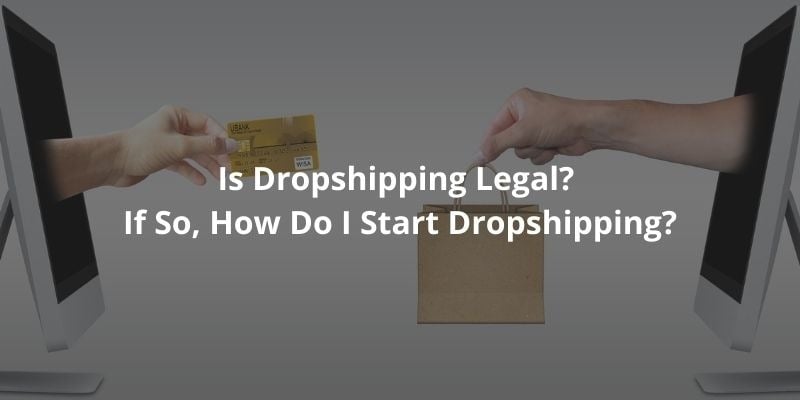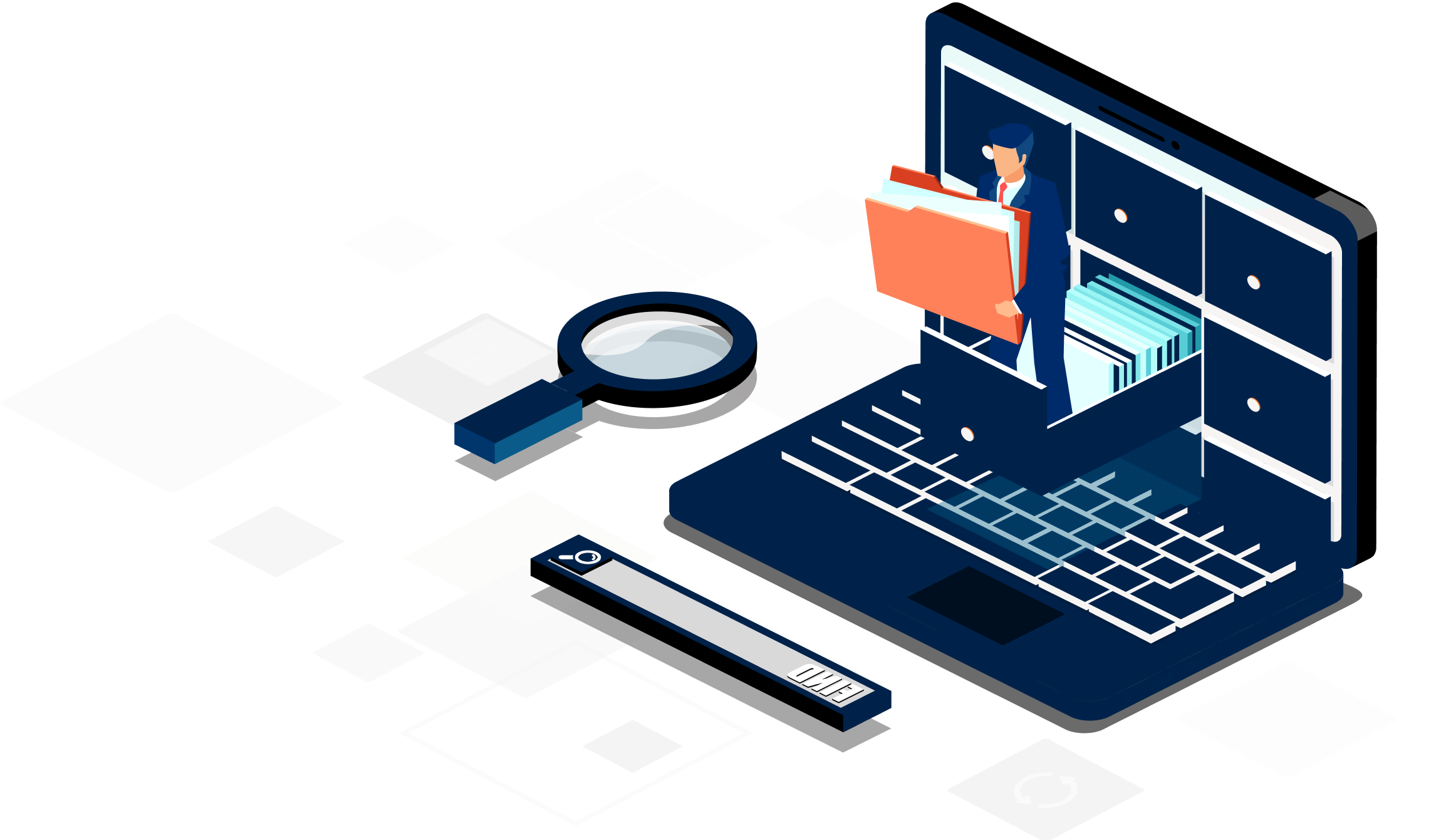The Legalities of Dropshipping: A Guide to Start Your Own Online Business
7 Dec 2023
19 Oct 2020
min read

Dropshipping is a retail fulfillment business model where businesses do not keep their products in stock and instead purchase products from a third-party supplier. This stands in contrast to the traditional e-commerce model, enabling online business retailers to benefit from the low overhead expenses and profit. While dropshipping sounds ideal, with less hassle and cost involved, many people remain skeptical of dropshipping as it almost sounds too good to be true. We will be telling you everything you need to know about dropshipping in this article and how you can start your own dropshipping e-commerce business.
What is Dropshipping?
Dropshipping is an e-commerce model in which a retailer can sell a product to a customer without holding any of it as inventory. Under this model, the dropshipper does not handle or even see the products sold to the customer at any point in time.
It is easier to understand dropshipping by breaking it down into a series of stages:
-
First, the customer purchases a product from the seller online at the retail price
-
The seller (the 'dropshipper') then places an order for this product from a third-party supplier paying the wholesale price (this is a price lower than the retail price)
-
The third-party dropshipping supplier ships the product directly to the customer
-
The dropshipper keeps the difference between the retail and wholesale prices. This is the dropshipper’s profit margin.
What makes dropshipping attractive is the minimal investment required to start up the business in an online marketplace and the low overheads. Unlike traditional brick and mortar retail stores, dropshippers do not need to make massive outlays on large containers of product or pay large sums to rent warehouses to store inventory.
The perks – the low start-up capital and overheads – have given dropshipping a reputation for being an ‘easy money and get rich quick scheme. Naturally, some individuals are skeptical and distrustful of dropshipping. More specifically, many wonder whether dropshipping is legal.

Benefits of Dropshipping
So, what are the benefits of dropshipping? Some key benefits include:
-
Less money, fees, and capital
-
It is easy to implement
-
Easier to scale
-
Flexible arrangements
-
Low overhead expenses
Is Dropshipping Legal?
So, is it legal? Yes, dropshipping is perfectly legal as no law claims it to be illegal or banned. But this does not mean you are in the clear, as under the dropshipping model, you may inadvertently do illegal things (which we will cover below). However, the main point we want to emphasise is that the model itself is legal. It is a legitimate and recognised model of business.
How to Start Dropshipping
To start a dropshipping business, you should follow these steps:
-
Find a niche to create your store in
-
Find a product within that niche to sell
-
Find a supplier for your product
-
Create your online dropshipping store
-
Obtain a business license
If you are stuck on the very first step of finding a niche, you can check out helpful resources on how to find your niche here: https://findniche.com/.
How to Start Dropshipping: In more detail
1. Find a niche to create your store in
Most successful dropshippers target a small and specific section of the wider market, called 'niche' markets. Focusing on a smaller niche market enables dropshippers to tailor their message and branding directly toward a smaller group of people. This is more effective than targeting the large mass market due to the broader and more varied tastes and preferences of individuals. As such, we recommend that the first step you should take is to identify a niche you want to target and centre your brand around.
Finding the right niche and selecting a suitable product often makes or breaks your chances of succeeding with dropshipping. When selecting a niche, we recommend you do two things:
(a) Make sure you are passionate about the niche
Picking niches you are passionate about means you will have more in-depth knowledge of them, allowing you to easily identify which products will and will not sell. Your passion and knowledge will reflect in your marketing of the product, as it will naturally be better and more effective than your competitors’ marketing.
(b) Make sure that demand for products in your niche is high
Dropshipping is ultimately a business. This means that to give yourself the chance to create a sustainable and profitable business, you should ensure there is sufficient demand for products in the niche you have selected.
A useful way of determining whether a niche is profitable is to type in the name of your niche into Google Trends. Google Trends measures the volume of people who search for a particular query over a period. If people consistently search for your niche, it is likely in ‘high demand’.
Some popular niches in which stores consistently perform well include fitness, pets, beauty, fishing, furniture, and electronics.

2. Find a product within that niche to sell
Next, you will need to pick a product to sell within the niche you have selected. To select a product, we recommend creating a list of products within your niche that fulfill the following criteria:
-
Product is in demand
-
The product has low availability
-
Product is profitable
We will now be going into the details of each criterion.
(a) Product is in demand
As mentioned above, to determine whether a niche is profitable, a useful indicator is its ranking on Google Trends. If people consistently search for your product, it is likely ‘in demand’.
Another way to determine whether a product is in demand is to look at industry reports and see what products other competitors dropshipping within your niche are selling.
(b) Product has low availability
Products that are not readily available at traditional brick-and-mortar stores suit the dropshipping model better than those that are readily available at physical stores. This is because customers are less likely to buy such products online if readily available at a physical store.
(c) Product is profitable
You should ensure the product is profitable. By profitable, we mean ‘profitable’ in that your product has a high perceived value. You should ensure that your product has a high enough perceived value such that you feel comfortable selling it even after adding a large enough profit margin to cover your costs. This is critical to ensure your business can become profitable and sustainable in the long run.
We also wanted to point out that there are two categories of products which you should not dropship:
-
Products containing prohibited and controlled items should be avoided
-
Products that infringe copyright or trademarks should be avoided
(a) Products containing prohibited and controlled items should be avoided
Dropshippers, like physical stores, must comply with laws governing controlled and prohibited products.
Controlled products are products that can be legally sold but require a license to be sold. Governments require businesses selling these products to have a license not just to ensure that the products are safe to use but also to promote a safe and healthy environment for communities in general. Common examples of ‘controlled products’ include alcohol, tobacco, and pharmaceutical products.
Prohibited products are products the sale of which is completely forbidden. Common examples of prohibited products include drugs and weapons.
Products that are prohibited or controlled vary by country. Therefore, as a dropshipper, you should thoroughly research any products you intend to sell to ensure you can legally sell them.
(b) Products that infringe copyright or trademarks should be avoided
Dropshippers should also ensure their products do not breach the intellectual property rights of other businesses. The most infringed intellectual property rights for dropshippers are copyright and trademarks.
Both copyright and trademarks are very similar in protecting businesses from having their intellectual property copied by others. They just differ in what intellectual property they protect. Copyright generally protects creative work that is artistic or literary. On the other hand, trademarks specifically protect against distinctive symbols, words, and designs that denote that a product comes from a particular source from being copied.
Products sold by dropshippers that breach copyright or trademarks tend to be products that feature logos of sports teams, pictures of celebrities, or pictures of famous cartoon characters.

3. Find a supplier for your product
After finding a product you would like to sell, you should find a supplier for this product. Most dropshippers find a supplier online using a supplier directory. Popular supplier directories include:
As you may have noticed, dropshippers are heavily reliant on their suppliers. They rely upon suppliers to keep the product being sold in stock, maintain product quality, and, most importantly ensure products are shipped to customers. Dropshippers who want to give themselves a realistic chance at creating a successful dropshipping business should therefore conduct rigorous due diligence on their potential suppliers.
Plugins are also available to help you with the logistics of using a supplier. For instance, if you choose to dropship from AliExpress, this AliDropship plugin review may be useful.
There are also some specific things you should know about your supplier before you decide whether they are worth partnering with:
-
(a) If the supplier works with dropshippers
This is important because some suppliers only sell their products in bulk and do not sell products individually, the latter of which dropshipping relies on.
-
(b) How long the supplier has been operating.
In general, the longer a supplier has been operating, the greater the level of quality and professionalism you can expect.
-
(c) Are there any reviews or ratings people have given the supplier online?
You should use any reviews or ratings to assess whether they are adequately reliable for your dropshipping business.
-
(d) Order a sample product to your house and test it out
This is probably the most important part of the due diligence process. Ordering a sample is important because you can evaluate the customer experience first-hand. Make sure to assess every aspect of the experience. How long did delivery take? Is the product quality good? Is the product packaging strong, and does it match your branding?
You should note that, unfortunately, even after conducting thorough due diligence, dropshippers remain exposed to numerous risks in dealing with their suppliers. Some of the most common issues include:
-
Suppliers delivering faulty goods to your customers
-
Suppliers, recognising the success of your brand, copying and selling the products with your branding to other people
-
Suppliers shipping products to the wrong address
These problems not only result in additional costs for re-shipping products to customers but can leave customers feeling frustrated, causing long-term damage to your brand.
Dropshippers can mitigate these risks by entering a Dropshipping Agreement with their suppliers. A Dropshipping Agreement is a written repository outlining the dropshipper’s (your) relationship with their supplier.
It protects the dropshipper as it outlines the responsibilities of the supplier if they make a mistake or do something wrong. For example, in the circumstance that they send a faulty product to a customer or the wrong address, the dropshipping agreement may demand that the supplier sends a replacement product.
A dropshipping agreement is an important source of protection for suppliers too. It outlines when payment is due and what rights the supplier has if the dropshipper decides not to pay the supplier for amounts due.
By clearly establishing what obligations you have as the dropshipper and what rights you have should things go wrong, the likelihood of resolving disputes amicably is dramatically increased. This is because if any dispute arises, having a dropshipping agreement, will allow you both to refer to it.
DocPro offers three different templates of Dropshipping Agreements which we recommend you use to adequately protect yourself.
Firstly, DocPro offers a neutral Dropshipping Agreement. This Agreement is drafted in neutral form, meaning it equally favours the dropshipper and supplier. You can find this version here: https://docpro.com/doc1782/dropshipping-agreement-neutral
Secondly, DocPro offers a Dropshipping Agreement favouring the dropshipper. Compared to the neutral Dropshipping Agreement, this agreement features a more favourable return policy and payment terms for the dropshipper. Amongst other things, it also gives the dropshipper greater rights should the supplier deliver products that are of bad quality. You can find this version here: https://docpro.com/doc1784/dropshipping-agreement-drop-shipping-vendor
Thirdly, DocPro offers a Dropshipping Agreement favouring the supplier. This version features a stricter return policy and payment terms compared to the neutral Dropshipping Agreement. Amongst other things, it also gives the dropshipper fewer rights should the supplier deliver faulty products. You can find this version here: https://docpro.com/doc1783/dropshipping-agreement-drop-shipping-supplier
-min.jpg)
4. Create your online dropshipping store
The next step in establishing your dropshipping business is to create your online store. Common platforms used to create online stores include Shopify and WordPress. At this stage, you can let your creativity take charge in bringing to life the brand that you envision.
When creating your website, make sure to include these three key documents on three separate pages:
-
Privacy Policy
-
Refund Policy
-
Terms and Conditions
(a) Privacy Policy
Countries worldwide have enacted laws to ensure that businesses that collect data from their customers use this data responsibly. As part of ensuring responsible use, many countries have enacted laws imposing obligations on businesses to inform users as to what data is being collected from them and how it will be used.
Every dropshipper will collect customer data in the form of customer names, customer addresses and phone numbers thus must ensure that they comply with these laws. Compliance can be achieved by using a privacy policy. A privacy policy is a document that outlines how you gather, use, and process the data of users of your website.
DocPro offers a template privacy policy that we recommend you use. You can find it here: https://docpro.com/doc107/privacy-policy-with-gdpr-website-mobile-app.
(b) Refund Policy
There is no legal requirement for dropshippers to have a refund policy on their website. Nonetheless, having a refund policy is a good idea for a couple of reasons.
Firstly, having a refund policy is a good idea for your brand as it creates a sense of security for the customer. Refund policies serve as a guarantee for the customer from the dropshipper that the product they are buying will be exactly as it is portrayed online. If this is not the case, the customer can expect to return it and get their money back.
Secondly, by including a refund policy on your online store, customers will be informed about their rights and entitlements should a product be faulty or otherwise not meet their expectations. Should a dissatisfied customer demand a refund, having a refund policy to refer to helps you amicably resolve the issue without it escalating it further.
If you don’t have a refund policy, you will likely be unable to reach this mutual understanding of the customer’s entitlements. In these instances, customers often openly dispute with payment providers like PayPal, complaining that the product that has been delivered does not match how it was represented online. This will also make your brand and its credibility will suffer.
DocPro offers a template refund policy which we recommend you use. You can find it here: https://docpro.com/doc110/refund-policy-website-app
(c) Terms and Conditions
The Terms and Conditions page outlines the rights and obligations of users of a website. It effectively serves as a contract between the user and you (the dropshipper), outlining rules for the usage of the website.
Despite it not being legally required, having terms and conditions on your website is an important precaution to lessen the legal risk for your business. Common terms you should include to protect your business include:
-
(i) Limitation of Liability
These terms limit the responsibility of the dropshipper (the site owner) if a user uses your dropshipping website and suffers some loss as a result.
-
(ii) Copyright
These terms ensure that all content on the website including logos, text, and images is the intellectual property of the dropshipper (the site owner).
-
(iii) Price Disclaimer:
These terms state that the prices for goods as stated on the website are accurate but can be changed without notifying the customer until the customer orders the product.
We have created a template that includes all these terms which you can use to draft the terms and conditions for your website. You can find it here: https://docpro.com/doc97/terms-and-conditions-of-service-website-mobile-app-user-agreement.
5. Obtain a business license
Whilst obtaining a business license is not necessary to start a dropshipping business, we believe it can be beneficial to your business for three reasons. Firstly, it can reduce your liability if something goes wrong. Secondly, for tax reasons. Thirdly, for legitimacy.
Firstly, obtaining a business license can be beneficial as it can limit liability. Dropshippers are heavily reliant upon their suppliers to ensure products are of satisfactory quality. Unfortunately, it is very common for suppliers to send faulty products to customers. If a disgruntled customer sues you for selling them a faulty product, you will want to ensure that your assets such as your house and car are safe from being taken away from you. Certain types of business structures – such as companies – can offer this very protection!
Secondly, registering as a business can be beneficial for tax reasons. Depending on your jurisdiction, registering as a business may allow you to benefit from more favourable tax rates.
Finally, obtaining a business license can help create a sense of legitimacy for your business. Having a business license often indicates professionalism and trustworthiness – both of which are critical if you want to become real partners with your supplier. Furthermore, displaying your business license on your website will help you appear trustworthy in the eyes of customers, increasing your overall sales.
For more information on the different types of business structures you could consider registering as and the pros and cons of each, you can check out our blog post on the subject: https://docpro.com/blog/which-business-structure-should-i-use-for-my-company-free-templates.
Disclaimer: Please note that this is a general summary of the position under common law and does not constitute legal advice. As the laws of each jurisdiction may be different, you may wish to consult your lawyer.
Keywords:

